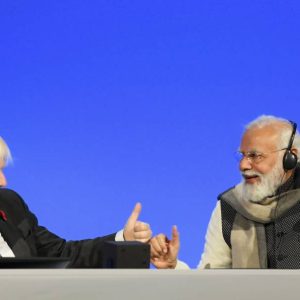Last week Volvo Cars said it would cease making diesel models in early 2024 as part of plans to go all electric by 2030. Both Stellantis and Ford have committed to going 100% electric in Europe by 2030…reports Asian Lite News
Britain’s decision to delay a ban on new fossil fuel car sales may make little difference to the pace of a shift to electric vehicles (EVs), even though the news drew anger from automakers worried about supply chains and investment uncertainty.
UK Prime Minister Rishi Sunak, who is expected to face a tough election in 2024, said the five-year delay to 2035 was not political and was about “doing what’s right for the country”.
Following polarised debate over emissions charges on older more polluting vehicles, he said he was seeking to help those stung by the cost-of-living crisis and unable to afford expensive EVs.
Industry analysts, however, said Sunak above all had undermined investment certainty when British companies are fighting to attract investors to a relatively small market cut loose from the European Union following Brexit.
Announced in 2020, the 2030 ban was touted by then prime minister Boris Johnson, with whom Sunak has clashed, as a way to establish British global EV leadership. The UK goal was ahead of the 2035 ban in the European Union, where most British-made cars are sold.
“We should have been at 2035 from day one, but it moved because it’s become part of a political debate,” said Philip Nothard, UK insight and strategy director at car dealer services company Cox Automotive. “The timing sends the message that things can change again, making it difficult for companies to manage their investment strategies.”
In the government’s original proposal, under a zero emission vehicle (ZEV) mandate on how many EVs carmakers have to sell, 80% of new cars sold in the UK would be fully electric by 2030 – with low emission hybrids allowed until 2035.
Under the new mandate that the government could make public as early as this week, the 80% 2030 electric target should remain – with the other 20% a mixture of fossil fuel models and hybrids until 2035.
While some carmakers have complained, Jaguar Land Rover said: “We look forward to the certainty the ZEV Mandate will bring.”
In 2022, around 1.6 million new cars were sold in Britain, just 2% of global sales, meaning the country has little impact on overall figures.
Global carmakers have already bet big on electric – partly because it is too expensive to make combustion engine cars while also investing heavily in EVs.
Britain’s delay “won’t make much of a difference,” said Andy Leyland, managing director of Supply Chain Insights. “Legacy automotive needs to go full electric to be able to compete on cost with Tesla and Chinese producers.”
Last week Volvo Cars said it would cease making diesel models in early 2024 as part of plans to go all electric by 2030. Both Stellantis and Ford have committed to going 100% electric in Europe by 2030.
The result will be a reduced selection of fossil fuel models.
Adrian Keen, CEO at UK rapid public EV charger company InstaVolt, operates 1,250 chargers and as EV prices fall, he expects consumers to keep buying them. So InstaVolt’s plans for 10,000 chargers by 2030 remain unchanged.
“For us, it’s business as usual,” Keen said.
But Andy Palmer, former CEO of Aston Martin, interpreted the delay as the latest sign the UK government lacks a long-term plan.
Palmer is chairman of Slovak EV battery startup Inobat, which was considering building battery plant in Britain, but is “focusing our attentions on Spain right now” because of its long-term industrial strategy and investor focus.
“In Britain, there’s no industrial strategy, no intent for industrial strategy and no desire for an industrial strategy,” Palmer said.
Meanwhile, Britain faces a looming “rules of origins” problem with its Brexit trade deal that could mean 10% tariffs imposed on EVs between Britain and the EU in 2024, a deal the EU shows little interest in changing.
“The UK (fossil fuel ban) delay is not a good sign in terms of stability, but they have realigned with EU regulation,” said Denis Schemoul, director of European vehicle forecasting at S&P Global Mobility. “But the implications of the rules of origin are much more immediate.”
ALSO READ-Yoon to Mark Historic Visit to the UK














